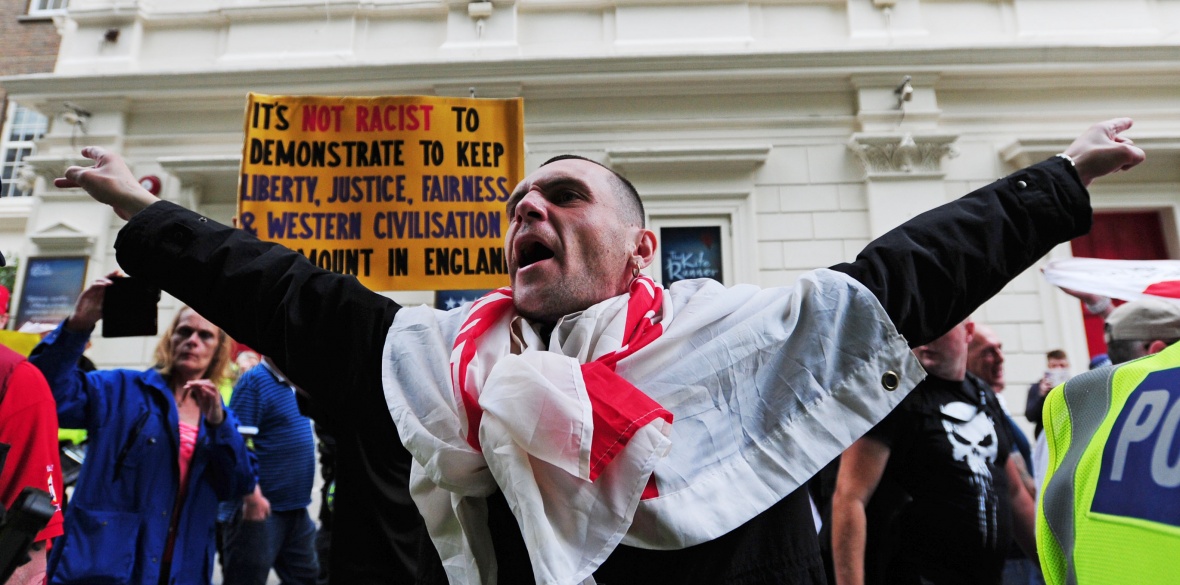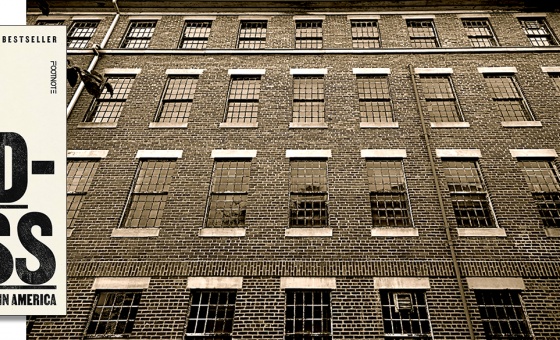This is the last article you can read this month
You can read more article this month
You can read more articles this month
Sorry your limit is up for this month
Reset on:
Please help support the Morning Star by subscribing here
WHY are top Tories fantasising about violence in the streets?
I don’t want to exaggerate — the Conservative Party hasn’t formed a street-fighting wing.
Young Conservative mobs haven’t been summoned up. They aren’t out there breaking windows or attacking demonstrations.
But Conservative ministers are daydreaming about broken glass and Molotov cocktails. And they like the vision.
How did the “party of law and order” become the party that dreams of rocks being thrown and cars being torched?
I think it shows a dark turn in Tory thought that is driven by weakness. It’s part of their gamble, where the party risks the lot on one card.
The reverie of riot is definitely there at the fringes.
At the end of September a “senior Cabinet minister” warned of “riots” or a “violent, popular uprising” if Brexit did not happen. The anonymous minister said the uprising would be like the French gilets jaunes or the 1992 LA riots.
In October, James Cleverly said he thought blocking Brexit would lead to a repeat of street violence on the scale of the 2011 riots.
These Tories are “warning” of riots, but it seems clear they are wishing for them.
Because why would the Tories allow riots to dictate their politics?
The Tories have repeatedly sparked riots through a policy of sharp cuts in social spending and “crackdowns” — as in the 1980s or 2011.
They have mostly responded by cracking down further. In the 1980s they responded to riots by giving police more flameproof uniforms, better shields and more effective clubs.
In 2011 they arranged for special courts to sit through the night to send kids to prison for stealing bottles of water.
Riots don’t normally frighten Tories much. Now they seem to excite them.
The idea of an “uprising” over Brexit is far-fetched. There have been violent acts inspired by Brexit politics, but they have tended to be extremely violent actions by small numbers of extreme rightwingers — like the assassination of Jo Cox, or small but fairly violent street protests by post-EDL-type groups.
The fantasy violence Tories seem to be leaning into this — Communities Minister Jake Berry started shouting: “Britain First! Britain First!” at Jeremy Corbyn this month.
“Britain First” was the name of a post-BNP fascist group, and one of the slogans Thomas Mair shouted as he murdered Jo Cox.
The widespread use of “traitor” and similar terms by the Tories and right-wing press to describe their opponents has a similar flavour.
So why have the Tories gone a bit odd?
This isn’t just about the Tories using tough, aggressive language. The “nasty party” has said plenty of nasty stuff.
In 1984 Thatcher described striking miners as “the enemy within,” arguing they should be beaten like the Argentinian army in the Falklands war — “the enemy without.” Thatcher literally declared war on strikers.
In 1979 Thatcher described immigrants in ugly terms, saying white people fear they “might be swamped by people from a different culture.”
But Thatcher’s rhetoric was part of a political strategy to strengthen the state. She wanted to build consensus for official violence against internal foes: her “enemy within” speech went with new laws and kit for the police and courts.
She spoke aggressively so the police would fight better with miners and the courts would sequestrate the union’s funds and imprison strikers.
Her “swamp” speech inspired a police action “Swamp 81” against black youth in Brixton. This sparked a riot, which in turn led to more equipment and powers for the police.
But current Tory dreams of violence are not part of a strategy of strengthening the state. They are based on a dream of non-state actors doing their dirty work.
They are a wish for spontaneous groups of thugs and bullies. They aren’t trying to organise anything, they are having some wishful thinking that a kind of bootboy Ex Machina will step in wearing size nines.
These fever dreams are inspired by weakness. The Tories have a minority government. They can’t force through their policy. They aren’t trying to organise power. They are pulling the levers and they aren’t working.
It’s a bit of a dream of being the political equivalent of disruptive digital “tech bros.” Maybe they don’t need to build a consensus, maybe they can just stir and smash and disrupt and come out the winner.
The Tories don’t have a majority, and support for their free market policies has been worn away by the crash and austerity.
But there is some popular support for Brexit, and some intense public feelings about nationalism, immigration and “Krauts.”
The Tories are gambling on just riding the Brexit wave back into power. Even some of their own leading MPs don’t agree, and have been expelled, so their strategy is to lower their head and rush for the door as a last-ditch gamble.
It’s a strategy inspired in part by Donald Trump — that tearing up the rule book and being right-wing loudmouths might just work.
I saw this when Boris Johnson made his “spacecraft” joke at Tory conference. He keeps making a “joke” about putting Jeremy Corbyn into a spacecraft and sending him into orbit in his speeches. It’s meant to be a “cheeky” equivalent to Trump’s “lock her up” demotic.
But when Johnson began the joke at a big Tory-DUP rally filled with young Tory lads in cheap blue suits, saying we “should invite Jeremy Corbyn to enter…” the crowd didn’t say “spacecraft”, they said “noose.”
Just as Trump rhetorically toyed with the violent thugs of the “alt-right,” so the Tories are playing with similar sentiments.
There’s a warning here: the Tory dreams of riots come out of weakness, out of a gamble, out of a roll of the dice.
But Trump did this and became the President of the United States. Sometimes crazy gambles pay off.
Labour is right to point to the ugliness of the rhetoric, but complaining the Tories are breaking the rules is not enough.
Lots of voters feel that the existing system and its rules have failed them. Labour needs to offer its own compelling view of the future against these dark Tory visions of violence.








